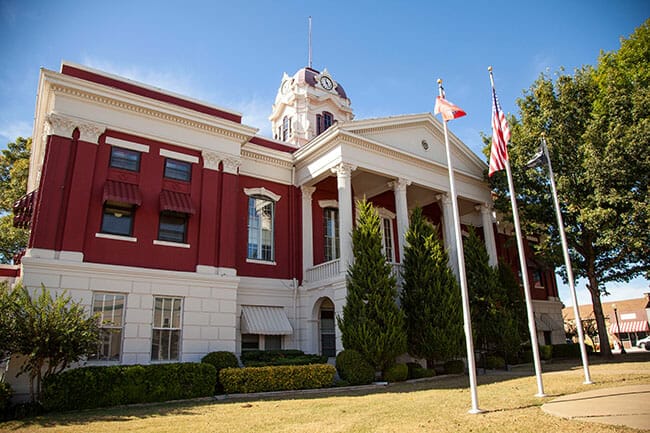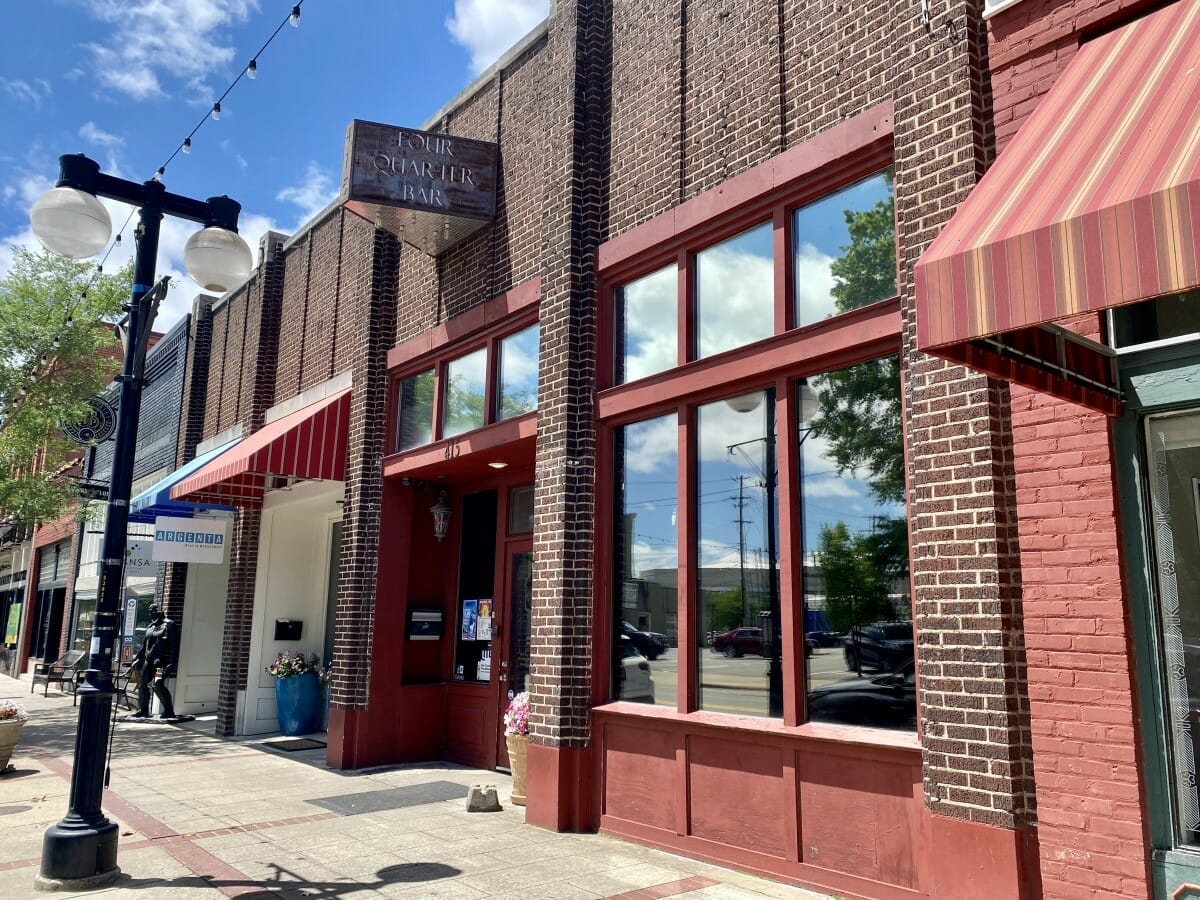

Uh oh...
It appears that you're using a severely outdated version of Safari on Windows. Many features won't work correctly, and functionality can't be guaranteed. Please try viewing this website in Edge, Mozilla, Chrome, or another modern browser. Sorry for any inconvenience this may have caused!
Read More about this safari issue.

From Arkansas, you can change the world.
Springdale resident Julianne Thompson volunteers with Heifer International and is part of the leadership team for the Hoof it for Heifer 20K run, held at Petit Jean State Park. Thompson started volunteering with the organization when she discovered they were building a new building and needed volunteers. At the time, she was settling in to Conway as a new resident and wanted interaction with other people as a potential outlet and to make new friends.

Thompson found herself drawn to the organization’s focus and intention. “Heifer was helping end poverty not only with gifts of animals, but also with training so that families could learn a skill that would be a way out of poverty for them. The fact that they focused on their own impact on the environment as well as educating others about caring for the Earth also was something that drew me.”
She did not expect the volunteer experience would turn into a life passion.
The same kind of passion ignited action in Dan West, who founded Heifer International 75 years ago. West’s assignment during a volunteer stint in the 1930s Spanish Civil War was to serve tired and scared refugees a single cup of milk. As he served cup after cup, his mind wandered to thinking of a better way to help. He knew if he could teach refugees a trade and the skills to raise their own cattle and grow their own crops, they would not have to keep coming back. They could provide milk for their family with one cow.
West’s travels abroad opened his eyes and changed his perspective. After seeing the scarcity of resources and food in an impoverished country, he knew Americans, more specifically, American farmers had more they could offer than “just a cup of milk.”

Heifer International operates their mission with the same philosophy to end world hunger: empower families and care for the Earth.
How does Heifer International focus on ending world hunger?
- Their approach is simple: teach people to grow their own food so they can begin to provide for themselves and their family, and further develop communities. The work is complex: building communities looks vastly different among the 25 countries where they work.
- While they provide help, support and training to more than 32 million families globally, there are still nearly 1 billion people around the world who live in poverty. That statistic drives them to keep going, moving into new countries and expanding efforts where they have established programs.

How does Heifer International focus on empowering families?
- By training people in sustainable farming and helping farmers gain market access: this focus of training not only moves individual farming families forward in income, but it also naturally moves forward whole farming communities when sustainable techniques are introduced, and revenue streams are developed. The process grows as producers and distributors interact.
- By empowering women: this critical element of community building is a cornerstone focus of the Heifer way. Through several case studies, they have been able to build a direct correlation between women’s empowerment and increased income and revenue streams for developing communities.
How does Heifer International focus on caring for the earth?
“Change isn’t linear; transformation in one sector influences change in others.”
- “Passing on the gift” is their main method of distribution. A first principle is that they pass on the first female offspring of their livestock to another family. This not only helps the distribution of resources but begins to pull in these families and teach the concepts of ownership, stewardship and giving.
- Heifer International uses a 12 Cornerstone Value-Based system that drives and leads all of their projects, project leaders, and new project selection and development. One of those values is Improving the Environment. This cornerstone teaches communities about biodiversity, water supply and waste management as well as soil erosion, watershed, forestation and sanitation: topics that for developing nations, mean life and death.

How can you get more involved with Heifer International in Arkansas?
- Eat lunch at the Café at Heifer Village. If you work or live in the Little Rock area, consider the Café at Heifer for your lunch meetings. The green space offers a nice view and place to reset from a morning at the office mentally. The eco-friendly building and industrial décor offer a great background for creative collaboration, and an additional bonus is that the food is really good, healthy, and part of their commitment to sustainability.
- Plan/host a playdate. It’s summer, and it’s hot. The Heifer International Discovery area is a great place for children to learn about the work of Heifer International in a sensory play center that explores all learning styles with sensory interaction. Picnic outside afterward or each lunch together in the Café.
- Purchase socially responsible gifts. Working with more than 20 companies in their online marketplace and more in their headquarters store means you are shopping with businesses that create more jobs instead of eliminating steps in the process (ethically sourced and fair trade friendly). You can buy purses, cheese, children’s toys, journals, and clothing all that employ families in countries like Guatemala and India, where new employment opportunities are scarce.
- Give a gift. Through the gift catalog, you can give a gift to one of the families Heifer serves globally while honoring a special occasion or milestone in a friend or loved one’s life. We live in a world full of “stuff,” and a gift from the Heifer International Gift Catalog provides an opportunity to celebrate and give.
- Volunteer. Heifer International also offers an educational ranch in Perryville, Arkansas where you can participate and lead programs, assist in livestock care and food preparation, or greet visitors and support the gift shop. Each spring they also host a Hoof it for Heifer 20K trail run at Petit Jean State Park. One thing that kept Julianne Thompson, a volunteer and mom who involves her whole family in serving at Heifer, getting more involved was learning about the Heifer USA program that works to empower farmers in Arkansas. “I love that Heifer works with local food entrepreneurs and farmers in our state and in turn, helps lift up whole communities. That is why we choose to donate all of the funds raised at the Hoof it for Heifer Trail Run to Heifer USA each year.”
- Heifer International prides themselves in transparency when it comes to how they spend their funds. They commit to the fact that only 5% of their funds are used for administrative costs and were labeled by Charity Navigator has having a 97% transparency accountability rating.
Join the Conversation
Leave a Comment
2 responses to “Heifer International Feeds More Than Your Soul”
 Leave a Reply
Leave a Reply
We do the work.
You check your email.
Sign up for our weekly e-news.
Get stories sent straight to your inbox!










 Leave a Reply
Leave a Reply
[…] Heifer International Headquarters, Cafe Village | Little Rock […]
[…] Village is a unique museum experience within the World Headquarters of Heifer International, focusing on consumption, sustainability […]